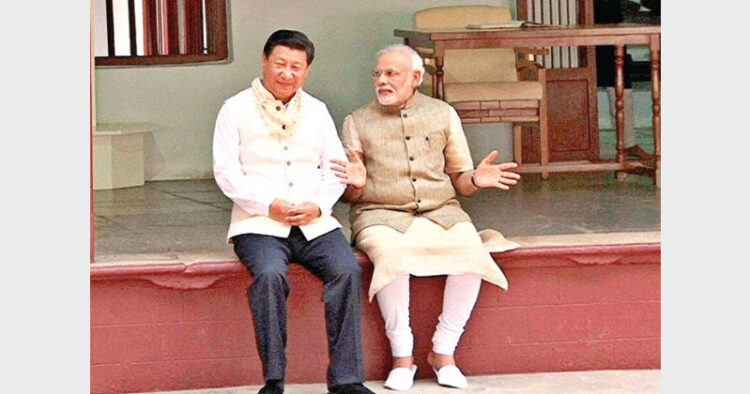Irrespective of the final outcome of Chinese President Xi Jinping's maiden visit to India, it surely marks a unique and qualitative change in the India-China relations. Hitherto, this relationship has been known more for its vocal than the real vital content. Observers of India-China relations, who had got used to watching India as the passive and docile partner in the diplomatic intercourse between two Asian neighbours, are pleasantly shocked to notice Chinese leaders going out of their way to please India since the Narendra Modi government was inaugurated in May this year.
Chinese President Xi Jinping's visit to India appears to have happened at a time and in an environment that was surely not tailored in the same fashion as Beijing had got used to dictating since past many decades.
The very first visit of Mr. Modi to Bhutan was far more than reassuring to this tiny Himalayan nation that has been feeling an uncomfortable pressure from China on a host of delicate issues. It was soon followed by his visit to Nepal that had already started suffering from the trauma of a honeymoon gone utterly wrong with her northern neighbour who, she thought, would countercheck India in Kathmandu's triangular love affair.
The most strategic halt of Mr. Modi's diplomatic bandwagon was at Japan whose relations with China, thanks to Beijing's belligerent and bullying postures have already entered the dangerous zone of late. Multiplied by the old personal rapport between Mr. Modi and his host Japanese Prime Minister Shinzo Abe, the duo was able to take India-Japan relations to a new orbit of mutual interest and cooperation. In this visit Modi-Abe duo gave a clear and unambiguous signal to their common bête-noir on who stands where in the most delicate triangle of today's Asia.
If this was not enough for China, Modi's government sent Indian President Pranab Mukherjee to China and Vietnam as the messenger of good will and peace from India. That section of diplomatic observers who love to interpret developments in more exciting manner than others, is underlining the fact that Indian President visited Vietnam via China only to ensure that he was not missed by the Chinese diplomatic radars on his visit to Vietnam. They specifically underlined the timing of this visit.
Also Read : Modi Talks Business with Jinping
It may be just a coincidence that only a day after the Indian President concluded his China visit and signed an Indo-Vietnam accord on supporting Vietnam in her section of South China Sea, and a couple of days before the Chinese President Xi Jinping started his India visit, the Chinese troops barged into Indian border area at Chumar in Ladakh.
What followed was something that was never seen or expected on such moments earlier during Congress dominated rule in New Delhi when bowing down to Chinese threats and hiding such events from the public view had come to stay as an accepted norm. This time, instead of downplaying the Chinese incursion, the Indian Prime Minister strongly objected to this act of Chinese Army and demanded his guest Xi to withdraw this aggression. Chinese army contingent vacated this aggression and moved back to its previous position by 9.45pm on the first night of its Commander-in-Chief's stay in India. The 16 agreements and MOUs signed between two countries during Xi's visit are expected to narrow the trade gap which has been so far keeping on disadvantage. One can hope that $20 billion committed as Chinese investment in India and opening of Chinese market to Indian companies will also contribute towards loosening political tensions on both sides.
Another interesting change in Chinese approach that has come to fore during Xi's visit is his offer to make India a member of Shanghai Group. But the way he has demanded membership of SAARC in return of this 'favour', it may not go down well with the Modi Government because New Delhi is quite wary of China overwhelming the SAARC to end India's supremacy in this forum. In the same public speech before a select audience Xi's attempt to put down India as a 'small' and a 'regional' power did not contribute much in improving feelings on the Indian side either.
One expected that Xi's visit may put an end to India's concerns over Chinese practice of issuing stapled visas to Indian citizens from Jammu & Kashmir and Arunachal. But not much distance appears to have been covered. Looking at China's claims over Arunachal Pradesh as 'Southern Tibet', the issue appears to be moving from bad to worse in future because of internal pressures in China than from India. China's offer to open Nathu La road for Indian Hindu pilgrims to visit Kailash Mansarovar will be seen as a welcome step in India. But this issue has its disadvantages as most pilgrims feel hurt to see their holy place under Chinese control.
Still, despite its limitations, Xi's India visit has surely taken India-China relations to a better place than ever in past many decades. At the same time it has added significantly to the international stature of Modi government in New Delhi in its dealings with other major countries.
On the other hand, Modi's style of dealing with India's neighbours, and now with China surely marks a qualitative and generic shift of Indian polity from a six decade old Nehruvian suicidal idealism to a pragmatic and self respecting style for which Sardar Patel has been always remembered and respected.
-Vijay Kranti (The writer is senior journalist who works on Tibet and China related issues)














Comments